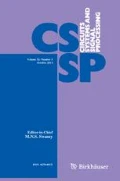Abstract
This paper proposes two identification methods for two-variable difference systems. The output and the input of the two-variable difference systems depend not only on time but also on spatial coordinates. A recursive least squares algorithm and a stochastic gradient algorithm are introduced to estimate the unknown parameters. Furthermore, in order to increase the convergence rate and to decrease the computational effort, a forgetting factor stochastic gradient algorithm is proposed. The simulation results indicate that the proposed methods are effective.


Similar content being viewed by others
References
S. Banerjee, J.V. Cole, K.F. Jensen, Nonlinear model reduction strategies for rapid thermal processing systems. IEEE Trans. Semicond. Manufac. 11(2), 266–275 (1998)
H.B. Chen, Y.S. Xiao, F. Ding, Hierarchical gradient parameter estimation algorithm for Hammerstein nonlinear systems using the key term separation principle. Appl. Math. Comput. 247, 1202–1210 (2014)
J. Chen, Several gradient parameter estimation algorithms for dual-rate sampled systems. J. Franklin Inst. Eng. Appl. Math. 351(1), 543–554 (2014)
J. Chen, R.F. Ding, Stochastic gradient algorithm for a dual-rate Box-Jenkins model based on auxiliary model and FIR model. J. Zhejiang Univ. Sci. C 15(2), 147–152 (2014)
J. Chen, Y.X. Ni, Parameter identification methods for an additive nonlinear system. Circuits Syst. Signal Process. 33(10), 3053–3064 (2014)
P.D. Christofides, Nonlinear and Robust Control of Partial Differential Equation Systems: Methods and Applications to Transport-Reaction Processes (Birkhauser, Boston, 2001)
F. Ding, P.X. Liu, H.Z. Yang, Parameter identification and intersample output estimation for dual-rate systems. IEEE Trans. Syst. Man Cyber. A Syst. Hum. 38(4), 966–975 (2008)
F. Ding, H.Z. Yang, F. Liu, Performance analysis of stochastic gradient algorithms under weak conditions. Sci. China Ser. F Inf. Sci. 51(9), 1269–1280 (2008)
F. Ding, System Identification-New Theory and Methods (Science Press, Beijing, 2013)
F. Ding, K.P. Deng, X.M. Liu, Decomposition based Newton iterative identification method for a Hammerstein nonlinear FIR system with ARMA noise. Circuits Syst. Signal Process. 33(9), 2881–2893 (2014)
F. Ding, X.M. Liu, H.B. Chen et al., Hierarchical gradient based and hierarchical least squares based iterative parameter identification for CARARMA systems. Signal Process. 97, 31–39 (2014)
F. Ding, Combined state and least squares parameter estimation algorithms for dynamic systems. Appl. Math. Model. 38(1), 403–412 (2014)
F. Ding, System Identification-Performances Analysis for Identification Methods (Science Press, Beijing, 2014)
F. Ding, Y.J. Wang, J. Ding, Recursive least squares parameter identification for systems with colored noise using the filtering technique and the auxiliary model. Digit. Signal Process. 37, 100–108 (2015)
F. Ding, T. Chen, Performance bounds of the forgetting factor least squares algorithm for time-varying systems with finite measurement data. IEEE Trans. Circuits Syst. I Regul. Papers 52(3), 555–566 (2005)
F. Ding, T. Chen, Performance analysis of multi-innovation gradient type identification methods. Automatica 43(1), 1–14 (2007)
G.C. Goodwin, K.S. Sin, Adaptive Filtering Prediction and Control (Prentice-Hall, Englewood Cliffs, 1984)
Y. Gu, F. Ding, J.H. Li, States based iterative parameter estimation for a state space model with multi-state delays using decomposition. Signal Process. 106, 294–230 (2015)
Y.P. Hong, H.X. Li, Comparative study of fluid dispensing modeling. IEEE Trans. Electron. Packag. Manufac. 26(4), 273–280 (2003)
H.Y. Hu, R. Ding, Least squares based iterative identification algorithms for input nonlinear controlled autoregressive systems based on the auxiliary model. Nonlinear Dyn. 76(1), 777–784 (2014)
Y. Ji, X.M. Liu, Unified synchronization criteria for hybrid switching-impulsive dynamical networks. Circuits Syst. Signal Process. 34(5), 1499–1517 (2015)
Y. Ji, X.M. Liu et al., New criteria for the robust impulsive synchronization of uncertain chaotic delayed nonlinear systems. Nonlinear Dyn. 79(1), 1–9 (2015)
H.X. Li, J. Liu, C.P. Chen et al., A simple model-based approach for fluid dispensing analysis and control. IEEE/ASME Trans. Mechatron. 12(4), 491–503 (2007)
J.H. Li, F. Ding, P. Jiang et al., Maximum likelihood recursive least squares estimation for multivariable systems. Circuits Syst. Signal Process. 33(9), 2971–2986 (2014)
H.X. Li, S.P. Guan, Hybrid intelligent control strategy—supervising a DCS-controlled batch process. IEEE Control Syst. Mag. 21(3), 36–48 (2001)
H.X. Li, C.K. Qi, Modeling of distributed parameter systems for applications—a synthesized review from time–space separation. J. Process Control 20(8), 891–901 (2010)
H.X. Li, C.K. Qi, Spatio-Temporal Modeling of Nonlinear Distributed Parameter Systems—A Time/space Separation Based Approach (Springer, Berlin, 2011)
C.K. Qi, H.X. Li, S.Y. Li et al., A fuzzy-based spatio-temporal multi-modeling for nonlinear distributed parameter processes. Appl. Soft Comput. 25, 309–321 (2014)
J. Seo, A. Khajepour, J.P. Huissoon, Thermal management in laminated die system. Int. J. Control Auto. Syst. 12(4), 794–804 (2014)
D.Q. Wang, H.B. Liu et al., Highly efficient identification methods for dual-rate Hammerstein systems. IEEE Trans. Control Syst. Tech. 23(5), 1952–1960 (2015)
L. Xu, L. Chen, W.L. Xiong, Parameter estimation and controller design for dynamic systems from the step responses based on the Newton iteration. Nonlinear Dyn. 79(3), 2155–2163 (2015)
J.Q. Yang, Y.T. Chen, X. Wang, Active mode identification and continuous state estimation for switched linear systems with unknown inputs and slow switching signal. Circuits Syst. Signal Process. (2015). doi:10.1007/s00034-014-9965-4
S.Y. Yu, Y. Cao, X. Zhou, Algorithm of parameter identification for temperature distributed parameter system of large-scale vertical quench furnace. J. Central South Univ. Sci. Tech. 39(6), 1285–1290 (2007)
S.K. Zhao, Z.H. Man, S.Y. Khoo et al., Variable step-size LMS algorithm with a quotient form. Signal Process. 89(1), 67–76 (2009)
Author information
Authors and Affiliations
Corresponding author
Additional information
This work was supported by the National Natural Science Foundation of China (Nos. 61403165, 61304138), the Natural Science Foundation of Jiangsu Province (Nos. BK20131109, BK20130163) and the Project of Philosophy and Social Science Research in Colleges and Universities in Jiangsu Province (No. 2014SJD381).
Rights and permissions
About this article
Cite this article
Chen, J., Jiang, B. Identification Methods for Two-Variable Difference Systems. Circuits Syst Signal Process 35, 3027–3039 (2016). https://doi.org/10.1007/s00034-015-0182-6
Received:
Revised:
Accepted:
Published:
Issue Date:
DOI: https://doi.org/10.1007/s00034-015-0182-6



